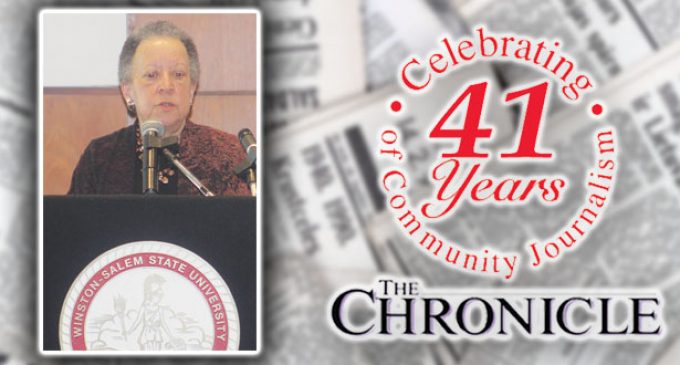Margaret Simms visits WSSU to expound on economic justice

Simms
BY TEVIN STINSON
THE CHRONICLE
Last week, Institute Fellow at the Urban Institute in Washington, D.C. Margaret C. Simms stopped by the campus of Winston-Salem State University to discuss economic justice, poverty, and racism.
During her half-hour lecture, Simms told the dozens of students and professors in attendance that the war on poverty is more than income support and job training programs. Simms said while poverty continues to decline across the country, the differences in income between black families and white families is proof that more has to be done.
“In 2014 black families had about 56 percent of the median income of white families,” said Simms. “In terms of family income, we don’t seem to be moving towards justice.”
Simms noted while blacks have made some progress in terms of moving up in higher income categories, they are still twice as likely to make a lower income.
“Is that justice?” asked Simms. “I think not.”
Simms also discussed federal programs and initiatives that were put in place to address poverty and racial barriers in the 1960s such as Affirmative Action, Equal Employment Opportunity Commission, Black Capitalism and others.
“The expectation of these programs was that they would have a greater impact on racial minorities,” said Simms. “Although minorities gained a lot from a number of these programs, many fell short of their goal of improving the quality of life of those in the worse situations.”
According to Simms, the programs did little to reduce the structural racism that tend to get in the way.
Structural Racism is defined as the normalization of historical, cultural, institutional, and interpersonal dynamics advantage of whites, while producing cumulative and chronic adverse outcomes for people of color.
Simms told the students, in order reduce poverty and inequality, they have to take the lessons learned from these programs, those that worked as well as those that didn’t, and use them to move toward economic justice in terms of employment opportunities.
As for structural racism, Simms said, “We have to come together and work towards building community assets that help connect people to jobs and support black entrepreneurship. “In the end,” continued Simms, “the solutions are not all that difficult to identify. It is the public will that will get them done. This cannot be solely a federal government effort.”
Following her lecture, students said they learned a lot about how the federal government plays a role in poverty and inequality that has been going on for years. Sophomore Aaron Johnson said, after listening to Simms, he now understands the importance of knowing the history of the African-American community.
“I learned a lot about the history of this nation and how it works,” said Johnson. “African-Americans have come a long way but we still have a lot of work to do.”Simms’ visit to WSSU was for the James A. Gray Lecture Series. Supported by an endowment established in 1952, the James A. Gray Lectures annually bring outstanding scholars and faith leaders to the campus to engage some of the most pressing issues in public life.











